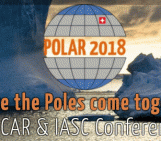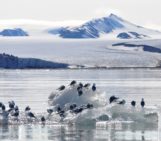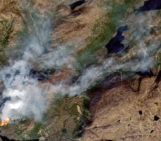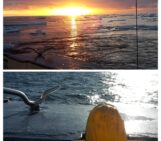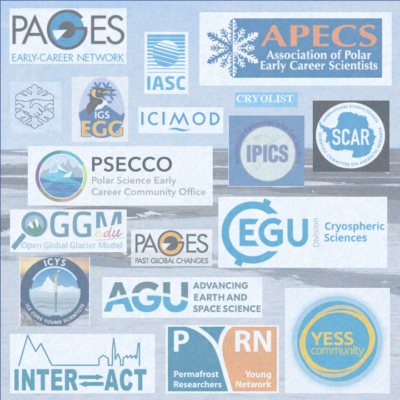
Are you starting your studies in cryospheric sciences, or are coming into our field from another subject? If so, you may have unsuspectingly waded into a (very thick) soup of acronyms! Don’t fret–here is your “one stop shop” that tells you where to look for more information!
Early Career Organisations

Photo credit: Marie Heidenreich (distributed via imaggeo.egu.eu)
Unless you’re fortunate enough to be working in a polar-oriented institute (some of our previous blog posts highlight some of these!) you may be surrounded by other researchers that work outside–or worse, are not interested in–polar research. In this case, you may find it beneficial to engage in polar-specific early career organisations. There are several of them, all with a slightly different target group, but all with the goal to federate and support the Early Career community around icy or polar topics. And the best thing: becoming a member is usually free! 🙂
APECS – the Association of Polar Early Career Scientists–is the overarching organisation that represents ECRs on the global stage, providing them with all kinds of news, updates and resources about the polar and alpine areas. They offer a number of project groups to engage in on the international level, but also have a number of National Committees that organise regional events, provide opportunities, and engage with the public. We encourage you to sign up to your National Committee by finding the one that represents the region that you live and/or work in!
APECS also fosters healthy connections between other early career organisations that are more specific in their scientific focus, such as the Permafrost Young Researchers Network (PYRN) and the Young Earth System Scientists (YESS). Their full list of partners and sponsors provides a non-exhaustive list of relevant ECR-oriented organisations.
IGS-EGG – the Early Career Glaciologist’s group – is the Early Career Network linked to the International Glaciological Society (IGS). The IGS-EGG is open to early-career researchers from glaciology or related to snow and ice sciences. They organise social events, workshops, and panel discussions at upcoming meetings (IGS and others). Their aim is to build a better community for ice-related ECS, where they can exchange ideas and discuss problems, foster career development, and get to know each other. They organise a seminar series that you can find here.
PSECCO – the Polar Science Early Career Community Office – funded by the US National Science Foundation Office of Polar Programs, is based in the United States. Their mission is to “empower and elevate early career scientists in the polar sciences, support a vibrant community, provide opportunities and resources, offer skill trainings and work together towards a more just, inclusive, diverse, equitable and accessible polar science environment”. It is only able to fund polar scientists based in the US through grants and participant support stipends but activities and events are open to polar scientists from all over the world. They also provide a Slack workspace and a monthly social hour (more information here).
ICYS – Ice Core Young Scientists group is an informal, international network of ECRs working on both polar and alpine ice cores or ice core-related sciences. Their mission is to inspire future collaborations and build a supportive ice core community by fostering connections between scientists early on in their career. They organise a seminar series (you can still watch past seminars on their page!) and a one-day workshop preceding each IPICS (International Partnerships in Ice Core Sciences) open science conference to which they are linked. You can sign up to be a member of ICYS to receive their news by email.
Arctic or Antarctic?
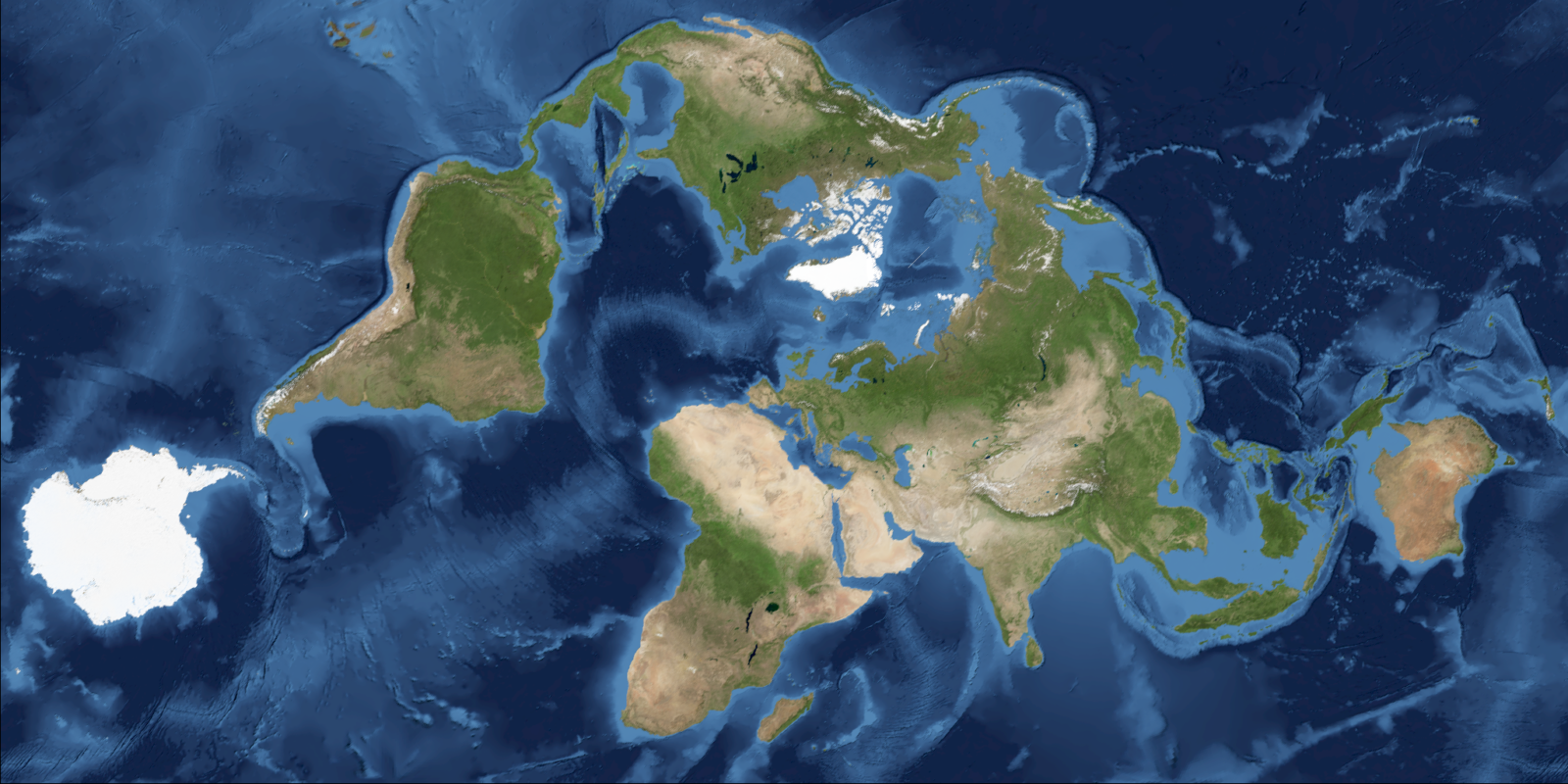
Whatever location you choose for your fieldwork or study area, it will have links to someone else’s work, research and questions. Figure credit: B. Grieger.
This same list of APECS partners and sponsors doubles as a handy resource for relevant organisations within the cryoverse.
Depending if you are team Arctic or Antarctic, you should have heard of IASC or SCAR, respectively. They are probably the main organisations bringing polar scientists together, coordinating research projects, advising other committees and even have their own conferences. IASC is the International Arctic Science Committee and is organised around five working groups (Atmosphere, Cryosphere, Marine, Social & Human and Terrestrial) in which also ECRs are involved through the IASC Fellowship Programme. SCAR is the Scientific Committee on Antarctic Research and, besides all their other important activities, supports ECRs through their fellowship programme. The programme offers funding for ECRs to actively engage in Antarctic field research and contribute to furthering the understanding of Antarctica.
ICIMOD plays a similar role as the Arctic Council in the Hindu-Kush-Himalaya. While the Norwegian polar academy organizes a series of 3 summer schools to discuss connections across the Arctic, the Antarctic and the Hindu-Kush-Himalaya. Note that for bachelor, master and PhD students, the University centre of Svalbard (UNIS) offers 6-week courses that are an incredible opportunity to discover the Arctic and meet your future colleagues.
PAGES is also a very relevant organisation for paleo cryo topics! Just like IASC, PAGES is organised around Working Groups which you can join just to be in their newsletters or participate more actively in (e.g. data collection, workshop organisation, webinars…). Each Working Group has a database that they curate. You might also be interested in joining the Early-Career Network which organises webinars, online discussion or small workshops. You can also contribute to PAGES’ Magazine or their Horizons magazine designed for teenagers and young adults.
Depending on whether you are more enthused by an US- or EU-focus, both the AGU and the EGU Cryosphere Divisions are wonderful communities that you can join by attending the general assemblies (held once a year, December for AGU and April/May for EGU) and joining events throughout the year such as campfires, webinars, game nights…
Finding funding?

Photo credit: micheile dot com on Unsplash.
There is a very extensive list of funding resources worldwide on the APECS website, worth a check be it to fund some fieldwork, attend a conference or to seed your next research project. There’s a very nice list of Earth Science Fellowship Opportunities here, although be aware that it is rather US-centric. Cryolist (see below) is also a good place to keep an eye out for funding calls! Of course, your first stop might be to check your own institute’s, university’s or governmental funding opportunities!
Planning fieldwork?
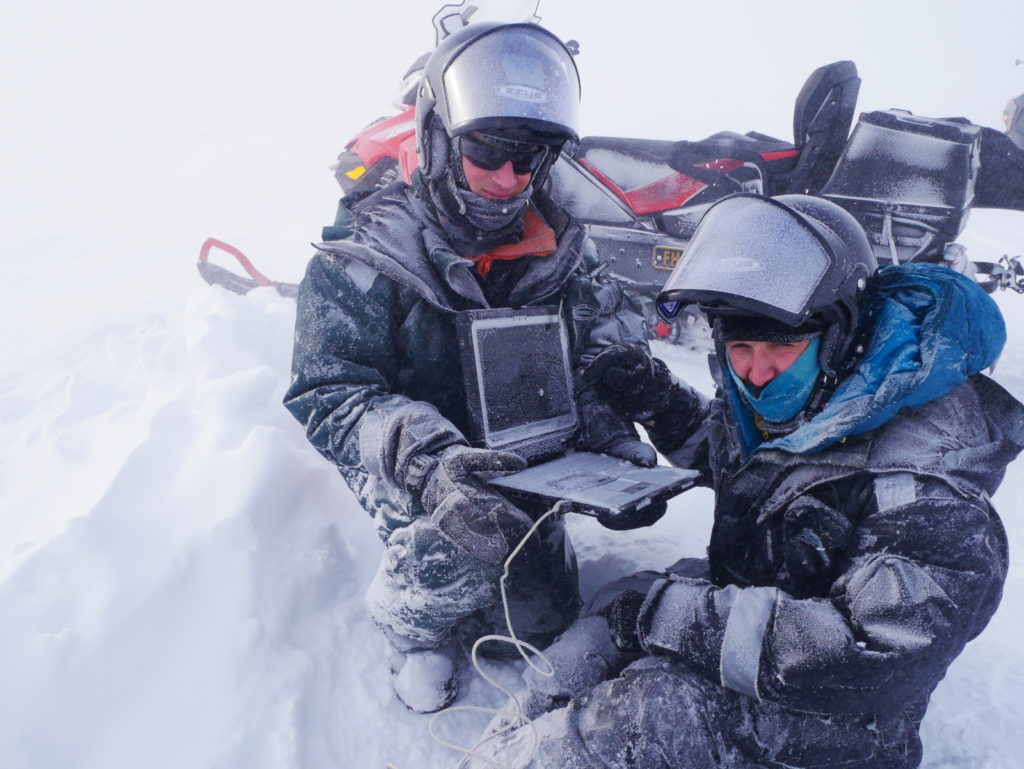
When you think that going up to the Arctic glaciers will take you away from your computer. Fieldwork always brings up unexpected moments. Photo credit: C. Bouchayer.
If you’ve got some fieldwork to plan, it’s always good to first ask your institute if they have any practical planning information. An additional must-read are the fieldwork guides from the EU project INTERACT: the practical field guide and the fieldwork planning handbook. And just recently, they also published their guide on reducing CO2 emissions in Arctic science.
Side note worth keeping in mind: INTERACT is a network of numerous Arctic field research stations (incl. Northern alpine areas) and offers support to ECRs to conduct their research on one of those field research stations.
If you would like to do some small fieldwork in Svalbard, there is a 10k euros-grant that you can apply for easily here.
Cryolist: the e-bulletin board for all things Cryospheric

Photo credit: Dan Cristian Pădureț on Unsplash.
If you’re looking for job postings, upcoming cryo-events or proposal calls, and general cryo-news, you’ll be able to receive them in your inbox via Cryolist, an electronic mail distribution list for all things related to cryospheric research.
Two tips from us, when/if you subscribe:
- Consider receiving your mails as a daily digest, which condenses all mailings into one email per day, sent at 12pm GMT.
- If you reply to an announcement, remember to not reply-all–unless you want to air your opinions to the entire listserve!
For those who are interested in more subject specific listserves, APECS has compiled a list of many cryo-related mailing lists (e.g. the Paleoclimate Discussion List or the marine mammal sciences list, MARMAM). You are more the fast news type? No worries, this Cryoblog post provides you with a list of inspiring twitter profiles!
Cryosphere resources, software, data and tools

Photo credit: Dan Cristian Pădureț on Unsplash.
If you are looking for a comprehensive list of data sources, models, tools and educational resources related to the cryosphere, the awesome-cryoshere github page is one of the places to be! They provide a curated community-driven list that covers a wide range of topics, from permafrost, ice sheets, glaciers, sea ice to snow. It is a great way to have an overview of what is being done in your field, and it can help you connect with other open source projects.
AntarcticGlaciers.org is a blog developed to “promote the science of Antarctic glaciology and to disseminate our findings to the wider community”. The focus is on published, peer-reviewed literature. This is a great resource for outreach towards the younger people and school children as it also provides exciting and original content useful for lesson planning.
OGGM-Edu is an educational website about glaciers. It includes interactive apps, graphics, notebooks and tutorials to understand how glaciers work and how they interact with the climate and topography. It is based on the Open Global Glacier Model, a community-based open-source glacier model.
CryoCommunity is a completely open great website created by a US-based community to generate, collate, and distribute best practices across a suite of academic processes and institution types. It includes teaching resources, fieldwork resources, professional development links, science communication advice, community links… and many others!
Mental health
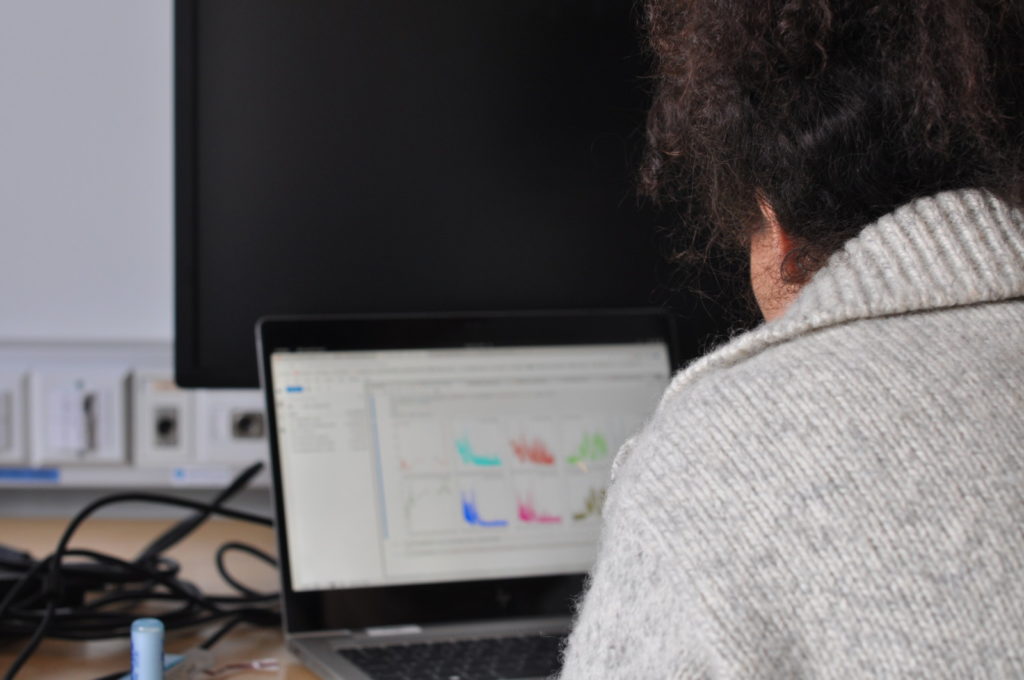
Weeks and months looking at your data could be tough and you might feel isolated. We all felt that, and the community is also here to talk about this and share our tips. Photo credit: Ugo Nanni.
With World Mental Health Day (10th October) only a few weeks ago and more and more studies showing how many in academia, especially ECRs, are struggling with mental health problems, we cannot leave this topic out and would like to draw your attention to the following resources. Our fellow EGU division for Tectonics and Structural Geology put together this collection of ‘Mind your Head’ blog posts, dealing with mental health struggles in academia. You will also soon be able to find a whole list of mental health resources via the APECS webpage, including this article by ECRs about job instability and international mobility.
For mothers in science, there is the SciMom Chats, a webinar series covering all kinds of topics related to motherhood in STEMM: “the aim of SciMom Chats is to support and empower mothers in STEMM, raise awareness and start conversations around the challenges of combining motherhood and a STEMM career”.
Last but not least: there is our blog, the famous weekly EGU Cryoblog 😉 which offers you all kinds of cryospheric fun facts, fieldwork stories, explanations of scientific phenomena, poetry, info and tips before the EGU General Assembly each year (e.g. last year’s!)… but also important discussions about mental health, parenthood!
We hope you find this list of resources useful! We know this list can never be complete, but it gives you a head start! And we’d love to hear from YOU about what you’ve found useful! Feel free to share them on Twitter with the tags @EGU_CR and #openCryoResources!
The EGU Cryoblog Team

